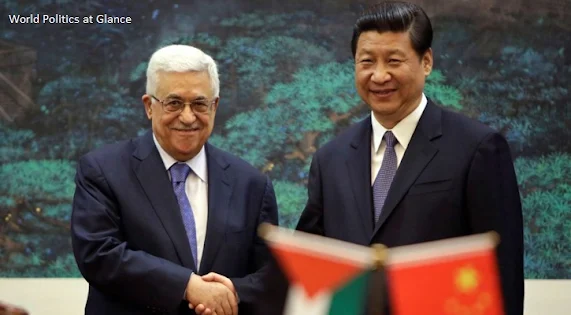 |
| Image Credit: Google |
Flashpoints:
- China's facilitation of Israeli-Palestinian peace talks during Mahmoud Abbas's visit to Beijing demonstrates its commitment to the region's affairs.
- This shows the increased Chinese willingness to challenge traditional U.S. influence in the Middle East.
- With strong bonds with Palestine and its active engagement in the Middle East, China seeks to contribute to finding a just and lasting solution to the Israeli-Palestinian conflict.
Introduction:
Palestinian
leader Mahmoud Abbas has arrived in Beijing for a four-day state visit. This
would be marking his fifth official visit to China.
China has
expressed its readiness to assist in facilitating Israeli-Palestinian peace
talks, underscoring its commitment to the region's affairs and challenging
traditional U.S. influence.
#FrontlineBreaking: #Palestinian President Mahmoud Abbas just arrived at #Beijing Capital International Airport, commencing his four-day visit to #China. He was greeted at the airport by Chinese Vice Foreign Minister Deng Li. #Chinarama #Palestine pic.twitter.com/6spqFzOU4c
— Frontline (@Frontlinestory) June 13, 2023
Details of Arrival and Meetings:
Mahmoud Abbas
landed in Beijing on Tuesday morning, according to state-run broadcaster CGTN.
During his
visit, he is expected to meet with China's President Xi Jinping.
He plans to
exchange opinions on the latest developments in the Palestinian arena, regional
issues, and international matters of mutual concern.
Abbas will also
meet Chinese Prime Minister Li Qiang in order to further enhance diplomatic
ties between Palestine and China.
Sino-Palestine Friendship and Diplomatic Support:
Foreign
ministry spokesman Wang Wenbin described Mahmoud Abbas as an "old and good
friend of the Chinese people" and emphasized China's unwavering support
for the Palestinian cause to restore their legitimate national rights.
China has
consistently championed the just cause of the Palestinian people, strengthening
its ties with Palestine.
#FrontlineBreaking: Chinese SC&FM @AmbQinGang meets with his #Palestinian counterpart Riyad al-Maliki in Beijing on Tuesday. The meeting comes as Palestinian President Mahmoud Abbass makes a state visit to #China from June 13 to 16. #Chinarama #ChinaPalestine #Palestine@pmofa pic.twitter.com/buCsSi9ONH
— Frontline (@Frontlinestory) June 13, 2023
China's Middle East Engagement:
Beijing has
actively sought to strengthen its ties to the Middle East, exemplified by its
role in brokering a rapprochement between Saudi Arabia and Iran in March.
By challenging
long-standing U.S. influence, China aims to establish itself as a key player in
the region's affairs.
Chinese
President Xi Jinping's visit to Saudi Arabia in December for the China-Arab
States Summit and subsequent meeting with Abbas demonstrated China's commitment
to working towards an early, just, and durable solution to the Palestinian
issue.
Iran's Visit and Proposed Summit:
China has
solidified its regional engagement by hosting Iran's President Ebrahim Raisi in
February. This was the first visit by an Iranian leader in 30 years.
Additionally,
Beijing has proposed an unprecedented summit involving Iran and the Gulf
Cooperation Council, which could potentially take place later this year.
These
initiatives underline China's proactive approach to Middle East affairs and its
aim to foster regional stability.
Strong Bonds with Palestine, “Friends closer than Brothers”:
Palestinian
official Abbas Zaki, in an interview with Chinese state news agency Xinhua,
expressed the deep friendship between China and Palestine.
He described is
as;
"Friends closer than Brothers."
Zaki commended that
China has increased its involvement in Middle East affairs.
The example can
be taken from following the China-Arab States Summit.
He also
highlighted the positive impact of China's engagement on the region.
U.S. Involvement and Stalled Peace Negotiations:
The United
States has also sought to address the heightened Israeli-Palestinian tension.
Secretary of
State Antony Blinken urged Israeli Prime Minister Benjamin Netanyahu not to
undermine the prospects for a Palestinian state.
However, peace
negotiations between Israel and Palestine have been at a standstill since 2014,
making international efforts crucial for reviving the peace process.










0 Comments